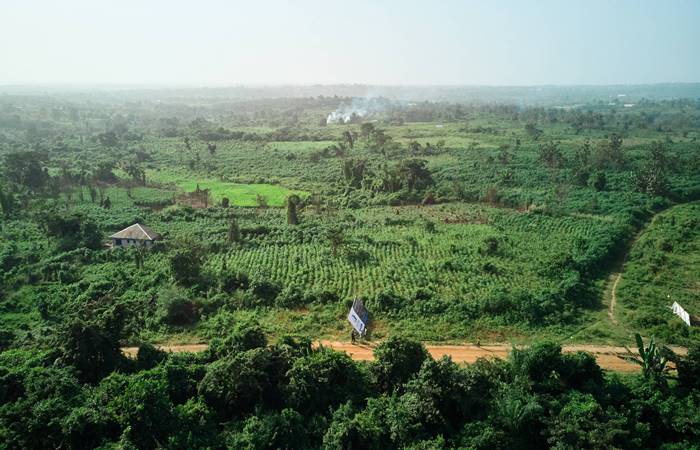
Buying land in Nigeria is one of the smartest investments you can make today—whether for building your dream home, setting up a commercial structure, or simply for land banking. However, the process is not always straightforward. Without the right knowledge, you could fall into traps like buying from land grabbers (omo onile), getting fake documents, or paying hidden fees.
In this detailed 2025 guide, we’ll walk you through the complete process of how to buy land in Nigeria, whether you’re looking in Lagos, Abuja, Ogun, Port Harcourt, or other states. You’ll learn the documents to request, the red flags to avoid, and how to legally secure your land without headaches.
Why Buy Land in Nigeria?
Real estate is one of the most reliable ways to build generational wealth in Nigeria. Land in key cities like Lagos, Abuja, and Port Harcourt appreciates rapidly, with prices doubling or tripling within a few years in hot locations.
Benefits of buying land include:
-
Capital appreciation – land rarely depreciates
-
Zero maintenance compared to building
-
Land banking opportunities
-
You can build at your own pace
-
No landlord issues
Step-by-Step Guide to Buying Land in Nigeria
Let’s walk you through each phase of the land acquisition process:
Step 1: Define Your Purpose and Budget
Are you buying land for:
-
Residential development?
-
Commercial use?
-
Farming?
-
Investment and resale?
Once you know your purpose, set a clear budget and determine:
-
Preferred location (e.g., Lagos mainland, Lekki, Abuja outskirts)
-
Plot size (600sqm, 300sqm, etc.)
-
Payment plan (outright or installment)
Tip: Don’t just look at the cost of the land. Also budget for documentation, legal fees, and potential development levies.
Step 2: Choose a Reliable Location
Location is everything.
Top places to buy land in 2025 include:
-
Lagos: Ibeju-Lekki, Epe, Ikorodu, Badagry, Alimosho
-
Abuja: Lugbe, Kuje, Kubwa, Gwagwalada
-
Ogun: Mowe, Ofada, Agbara, Shimawa
-
Port Harcourt: Eleme, Oyigbo, Rumuokwurusi
Consider factors like:
-
Accessibility (good roads, proximity to main roads)
-
Security and population growth
-
Government infrastructure plans
-
Presence of title documents
ALSO READ: NCAA Approves Max Air to Resume Domestic Flights After 90-Day Suspension
Step 3: Identify the Land and Inspect Physically
Do NOT buy land without seeing it.
-
Go with a trusted real estate agent or surveyor
-
Confirm the exact location, size, and boundaries
-
Check for encroachments or disputes
-
Talk to locals to know land history
Red Flag: If the seller refuses site inspection, walk away.
Step 4: Request These Vital Documents
Before you pay one kobo, ask for the following:
-
Survey Plan – shows the coordinates and size
-
Deed of Assignment or Land Purchase Receipt
-
Certificate of Occupancy (C of O) or Governor’s Consent
-
Excision or Gazette (for Lagos especially)
-
Tax clearance or any other applicable levy documents
Red Flag: “We will process the C of O after payment” – Ask them to process it first or give a verified title copy.
Step 5: Conduct Due Diligence and Land Verification
Engage a lawyer and surveyor to help with verification.
-
Verify the title at the land registry
-
Use the coordinates to confirm land ownership
-
Ensure the land is not under government acquisition
-
Confirm there are no litigations or family disputes
Pro Tip: In Lagos, check with the Bureau of Lands and the Office of the Surveyor General.
Step 6: Negotiate and Draft a Sales Agreement
Once you’re satisfied, negotiate price and payment terms.
Get a lawyer to draft a formal Deed of Assignment or Contract of Sale. This document must include:
-
Seller’s details
-
Buyer’s details
-
Land description (location, size, coordinates)
-
Agreed amount and payment method
-
Delivery of documents and possession date
Step 7: Make Payment Through Traceable Means
Always pay through a bank transfer to the seller’s account or their lawyer’s escrow account. Avoid cash.
Get a payment receipt and acknowledgement letter signed by all parties.
Step 8: Perfect the Land Title
To fully own and protect your land legally:
-
Obtain Governor’s Consent (if deed is from another buyer)
-
Register the Deed at the Land Registry
-
Get a Building Plan Approval (if you want to start building)
-
Process your own C of O (optional but adds value)
Red Flag: If a land is said to be “under C of O processing,” ask to see the file number and verify it at the Ministry of Lands.
How to Buy Land from Real Estate Companies in Nigeria
Buying from registered real estate companies can be safer, especially for beginners.
Pros:
-
Installment payment plans
-
Often come with titled lands (Excision, Gazette, C of O)
-
Reduced omo onile harassment
But still:
-
Verify their RC number with CAC
-
Confirm actual title documents
-
Visit the land physically
-
Read their terms and refund policies
Costs Involved in Buying Land
-
Land price (varies by location and size)
-
Survey Plan: ₦100,000–₦500,000+
-
Legal fees: 5% of land cost (negotiable)
-
Deed of Assignment: ₦50,000–₦300,000+
-
Agency fee: 5%–10% (if applicable)
-
Title perfection (C of O, Governor’s Consent): ₦300,000–₦1,000,000+
How to Avoid Land Scams in Nigeria
-
Never pay without verifying ownership
-
Don’t rush under pressure
-
Avoid “family lands” without proper documentation
-
Deal only with people who have decision-making rights
-
Use professionals—lawyers, surveyors, realtors
Final Thoughts: Buying Land in Nigeria in 2025
If done right, buying land in Nigeria is a powerful way to build wealth and secure your future. But take your time, verify documents, and don’t cut corners. Always work with professionals and don’t be afraid to walk away from suspicious deals.
Need help buying land in Lagos, Abuja, Ogun, or anywhere in Nigeria?
FinanceBobo.com connects you with trusted real estate agents and land consultants. Contact us today for verified lands with titles.




